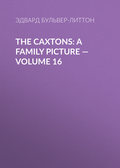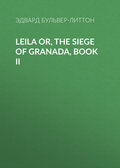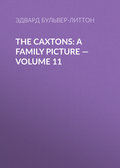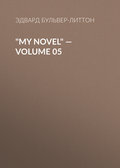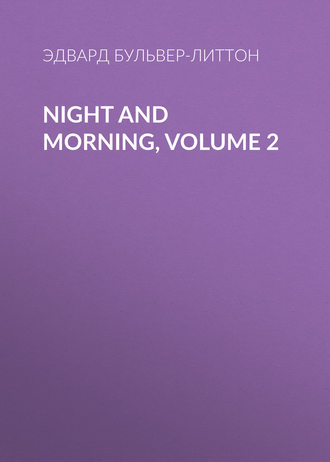
Эдвард Бульвер-Литтон
Night and Morning, Volume 2
Book II
CHAPTER I
"Incubo. Look to the cavalier. What ails he?
.....
Hostess. And in such good clothes, too!"
BEAUMONT AND FLETCHER: Love's Pilgrimage.
"Theod. I have a brother—there my last hope!.
Thus as you find me, without fear or wisdom,
I now am only child of Hope and Danger."—Ibid.
The time employed by Mr. Beaufort in reaching his home was haunted by gloomy and confused terrors. He felt inexplicably as if the denunciations of Philip were to visit less himself than his son. He trembled at the thought of Arthur meeting this strange, wild, exasperated scatterling—perhaps on the morrow—in the very height of his passions. And yet, after the scene between Arthur and himself, he saw cause to fear that he might not be able to exercise a sufficient authority over his son, however naturally facile and obedient, to prevent his return to the house of death. In this dilemma he resolved, as is usual with cleverer men, even when yoked to yet feebler helpmates, to hear if his wife had anything comforting or sensible to say upon the subject. Accordingly, on reaching Berkeley Square, he went straight to Mrs. Beaufort; and having relieved her mind as to Arthur's safety, related the scene in which he had been so unwilling an actor. With that more lively susceptibility which belongs to most women, however comparatively unfeeling, Mrs. Beaufort made greater allowance than her husband for the excitement Philip had betrayed. Still Beaufort's description of the dark menaces, the fierce countenance, the brigand-like form, of the bereaved son, gave her very considerable apprehensions for Arthur, should the young men meet; and she willingly coincided with her husband in the propriety of using all means of parental persuasion or command to guard against such an encounter. But, in the meanwhile, Arthur returned not, and new fears seized the anxious parents. He had gone forth alone, in a remote suburb of the metropolis, at a late hour, himself under strong excitement. He might have returned to the house, or have lost his way amidst some dark haunts of violence and crime; they knew not where to send, or what to suggest. Day already began to dawn, and still he came not. A length, towards five o'clock, a loud rap was heard at the door, and Mr. Beaufort, hearing some bustle in the hall, descended. He saw his son borne into the hall from a hackney-coach by two strangers, pale, bleeding, and apparently insensible. His first thought was that he had been murdered by Philip. He uttered a feeble cry, and sank down beside his son.
"Don't be darnted, sir," said one of the strangers, who seemed an artisan; "I don't think he be much hurt. You sees he was crossing the street, and the coach ran against him; but it did not go over his head; it be only the stones that makes him bleed so: and that's a mercy."
"A providence, sir," said the other man; "but Providence watches over us all, night and day, sleep or wake. Hem! We were passing at the time from the meeting—the Odd Fellows, sir—and so we took him, and got him a coach; for we found his card in his pocket. He could not speak just then; but the rattling of the coach did him a deal of good, for he groaned—my eyes! how he groaned! did he not, Burrows?"
"It did one's heart good to hear him."
"Run for Astley Cooper—you—go to Brodie. Good Heavens! he is dying.
Be quick—quick!" cried Mr. Beaufort to his servants, while Mrs. Beaufort, who had now gained the spot, with greater presence of mind had Arthur conveyed into a room.
"It is a judgment upon me," groaned Beaufort, rooted to the stone of his hall, and left alone with the strangers. "No, sir, it is not a judgment, it is a providence," said the more sanctimonious and better dressed of the two men "for, put the question, if it had been a judgment, the wheel would have gone over him—but it didn't; and, whether he dies or not, I shall always say that if that's not a providence, I don't know what is. We have come a long way, sir; and Burrows is a poor man, though I'm well to do."
This hint for money restored Beaufort to his recollection; he put his purse into the nearest hand outstretched to clutch it, and muttered forth something like thanks.
"Sir, may the Lord bless you! and I hope the young gentleman will do well. I am sure you have cause to be thankful that he was within an inch of the wheel; was he not, Burrows? Well, it's enough to convert a heathen. But the ways of Providence are mysterious, and that's the truth of it. Good night, sir."
Certainly it did seem as if the curse of Philip was already at its work. An accident almost similar to that which, in the adventure of the blind man, had led Arthur to the clue of Catherine, within twenty-four hours stretched Arthur himself upon his bed. The sorrow Mr. Beaufort had not relieved was now at his own hearth. But there were parents and nurses, and great physicians, and skilful surgeons, and all the army that combine against Death, and there were ease, and luxury, and kind eyes, and pitying looks, and all that can take the sting from pain. And thus, the very night on which Catherine had died, broken down, and worn out, upon a strange breast, with a feeless doctor, and by the ray of a single candle, the heir to the fortunes once destined to her son wrestled also with the grim Tyrant, who seemed, however, scared from his prey by the arts and luxuries which the world of rich men raises up in defiance of the grave.
Arthur, was, indeed, very seriously injured; one of his ribs was broken, and he had received two severe contusions on the head. To insensibility succeeded fever, followed by delirium. He was in imminent danger for several days. If anything could console his parents for such an affliction, it was the thought that, at least, he was saved from the chance of meeting Philip.
Mr. Beaufort, in the instinct of that capricious and fluctuating conscience which belongs to weak minds, which remains still, and drooping, and lifeless, as a flag on a masthead during the calm of prosperity, but flutters, and flaps, and tosses when the wind blows and the wave heaves, thought very acutely and remorsefully of the condition of the Mortons, during the danger of his own son. So far, indeed, from his anxiety for Arthur monopolising all his care, it only sharpened his charity towards the orphans; for many a man becomes devout and good when he fancies he has an Immediate interest in appeasing Providence. The morning after Arthur's accident, he sent for Mr. Blackwell. He commissioned him to see that Catherine's funeral rites were performed with all due care and attention; he bade him obtain an interview with Philip, and assure the youth of Mr. Beaufort's good and friendly disposition towards him, and to offer to forward his views in any course of education he might prefer, or any profession he might adopt; and he earnestly counselled the lawyer to employ all his tact and delicacy in conferring with one of so proud and fiery a temper. Mr. Blackwell, however, had no tact or delicacy to employ: he went to the house of mourning, forced his way to Philip, and the very exordium of his harangue, which was devoted to praises of the extraordinary generosity and benevolence of his employer, mingled with condescending admonitions towards gratitude from Philip, so exasperated the boy, that Mr. Blackwell was extremely glad to get out of the house with a whole skin. He, however, did not neglect the more formal part of his mission; but communicated immediately with a fashionable undertaker, and gave orders for a very genteel funeral. He thought after the funeral that Philip would be in a less excited state of mind, and more likely to hear reason; he, therefore, deferred a second interview with the orphan till after that event; and, in the meanwhile, despatched a letter to Mr. Beaufort, stating that he had attended to his instructions; that the orders for the funeral were given; but that at present Mr. Philip Morton's mind was a little disordered, and that he could not calmly discuss the plans for the future suggested by Mr. Beaufort. He did not doubt, however, that in another interview all would be arranged according to the wishes his client had so nobly conveyed to him. Mr. Beaufort's conscience on this point was therefore set at rest. It was a dull, close, oppressive morning, upon which the remains of Catherine Morton were consigned to the grave. With the preparations for the funeral Philip did not interfere; he did not inquire by whose orders all that solemnity of mutes, and coaches, and black plumes, and crape bands, was appointed. If his vague and undeveloped conjecture ascribed this last and vain attention to Robert Beaufort, it neither lessened the sullen resentment he felt against his uncle, nor, on the other hand, did he conceive that he had a right to forbid respect to the dead, though he might reject service for the survivor. Since Mr. Blackwell's visit, he had remained in a sort of apathy or torpor, which seemed to the people of the house to partake rather of indifference than woe.
The funeral was over, and Philip had returned to the apartments occupied by the deceased; and now, for the first time, he set himself to examine what papers, &c., she had left behind. In an old escritoire, he found, first, various packets of letters in his father's handwriting, the characters in many of them faded by time. He opened a few; they were the earliest love-letters. He did not dare to read above a few lines; so much did their living tenderness, and breathing, frank, hearty passion, contrast with the fate of the adored one. In those letters, the very heart of the writer seemed to beat! Now both hearts alike were stilled! And GHOST called vainly unto GHOST!
He came, at length, to a letter in his mother's hand, addressed to himself, and dated two days before her death. He went to the window and gasped in the mists of the sultry air for breath. Below were heard the noises of London; the shrill cries of itinerant vendors, the rolling carts, the whoop of boys returned for a while from school. Amidst all these rose one loud, merry peal of laughter, which drew his attention mechanically to the spot whence it came; it was at the threshold of a public-house, before which stood the hearse that had conveyed his mother's coffin, and the gay undertakers, halting there to refresh themselves. He closed the window with a groan, retired to the farthest corner of the room, and read as follows:
"MY DEAREST PHILIP,—When you read this, I shall be no more. You and poor Sidney will have neither father nor mother, nor fortune, nor name. Heaven is more just than man, and in Heaven is my hope for you. You, Philip, are already past childhood; your nature is one formed, I think, to wrestle successfully with the world. Guard against your own passions, and you may bid defiance to the obstacles that will beset your path in life. And lately, in our reverses, Philip, you have so subdued those passions, so schooled the pride and impetuosity of your childhood, that I have contemplated your prospects with less fear than I used to do, even when they seemed so brilliant. Forgive me, my dear child, if I have concealed from you my state of health, and if my death be a sudden and unlooked-for shock. Do not grieve for me too long. For myself, my release is indeed escape from the prison-house and the chain—from bodily pain and mental torture, which may, I fondly hope, prove some expiation for the errors of a happier time. For I did err, when, even from the least selfish motives, I suffered my union with your father to remain concealed, and thus ruined the hopes of those who had rights upon me equal even to his. But, O Philip! beware of the first false steps into deceit; beware, too, of the passions, which do not betray their fruit till years and years after the leaves that look so green and the blossoms that seem so fair.
"I repeat my solemn injunction—Do not grieve for me; but strengthen your mind and heart to receive the charge that I now confide to you—my Sidney, my child, your brother! He is so soft, so gentle, he has been so dependent for very life upon me, and we are parted now for the first and last time. He is with strangers; and—and—O Philip, Philip! watch over him for the love you bear, not only to him, but to me! Be to him a father as well as a brother. Put your stout heart against the world, so that you may screen him, the weak child, from its malice. He has not your talents nor strength of character; without you he is nothing. Live, toil, rise for his sake not less than your own. If you knew how this heart beats as I write to you, if you could conceive what comfort I take for him from my confidence in you, you would feel a new spirit—my spirit—my mother-spirit of love, and forethought, and vigilance, enter into you while you read. See him when I am gone—comfort and soothe him. Happily he is too young yet to know all his loss; and do not let him think unkindly of me in the days to come, for he is a child now, and they may poison his mind against me more easily than they can yours. Think, if he is unhappy hereafter, he may forget how I loved him, he may curse those who gave him birth. Forgive me all this, Philip, my son, and heed it well.
"And now, where you find this letter, you will see a key; it opens a well in the bureau in which I have hoarded my little savings. You will see that I have not died in poverty. Take what there is; young as you are, you may want it more now than hereafter. But hold it in trust for your brother as well as yourself. If he is harshly treated (and you will go and see him, and you will remember that he would writhe under what you might scarcely feel), or if they overtask him (he is so young to work), yet it may find him a home near you. God watch over and guard you both! You are orphans now. But HE has told even the orphans to call him 'Father!'"
When he had read this letter, Philip Morton fell upon his knees, and prayed.
CHAPTER II
"His curse! Dost comprehend what that word means?
Shot from a father's angry breath."
JAMES SHIRLEY: The Brothers.
"This term is fatal, and affrights me."
—Ibid.
"Those fond philosophers that magnify
Our human nature . . . . . .
Conversed but little with the world-they knew not
The fierce vexation of community!"
—Ibid.
After he had recovered his self-possession, Philip opened the well of the bureau, and was astonished and affected to find that Catherine had saved more than L100. Alas! how much must she have pinched herself to have hoarded this little treasure! After burning his father's love-letters, and some other papers, which he deemed useless, he made up a little bundle of those trifling effects belonging to the deceased, which he valued as memorials and relies of her, quitted the apartment, and descended to the parlour behind the shop. On the way he met with the kind servant, and recalling the grief that she had manifested for his mother since he had been in the house, he placed two sovereigns in her hand. "And now," said he, as the servant wept while be spoke, "now I can bear to ask you what I have not before done. How did my poor mother die? Did she suffer much?—or—or—"
"She went off like a lamb, sir," said the girl, drying her eyes. "You see the gentleman had been with her all the day, and she was much more easy and comfortable in her mind after he came."
"The gentleman! Not the gentleman I found here?"
"Oh, dear no! Not the pale middle-aged gentleman nurse and I saw go down as the clock struck two. But the young, soft-spoken gentleman who came in the morning, and said as how he was a relation. He stayed with her till she slept; and, when she woke, she smiled in his face—I shall never forget that smile—for I was standing on the other side, as it might be here, and the doctor was by the window, pouring out the doctor's stuff in the glass; and so she looked on the young gentleman, and then looked round at us all, and shook her head very gently, but did not speak. And the gentleman asked her how she felt, and she took both his hands and kissed them; and then he put his arms round and raised her up to take the physic like, and she said then, 'You will never forget them?' and he said, 'Never.' I don't know what that meant, sir!"
"Well, well—go on."
"And her head fell back on his buzzom, and she looked so happy; and, when the doctor came to the bedside, she was quite gone."
"And the stranger had my post! No matter; God bless him—God bless him. Who was he? what was his name?"
"I don't know, sir; he did not say. He stayed after the doctor went, and cried very bitterly; he took on more than you did, sir."
"And the other gentleman came just as he was a-going, and they did not seem to like each other; for I heard him through the wall, as nurse and I were in the next room, speak as if he was scolding; but he did not stay long."
"And has never been seen since?"
"No, sir. Perhaps missus can tell you more about him. But won't you take something, sir? Do—you look so pale."
Philip, without speaking, pushed her gently aside, and went slowly down the stairs. He entered the parlour, where two or three children were seated, playing at dominoes; he despatched one for their mother, the mistress of the shop, who came in, and dropped him a courtesy, with a very grave, sad face, as was proper.
"I am going to leave your house, ma'am; and I wish to settle any little arrears of rent, &c."
"O sir! don't mention it," said the landlady; and, as she spoke, she took a piece of paper from her bosom, very neatly folded, and laid it on the table. "And here, sir," she added, taking from the same depository a card,—"here is the card left by the gentleman who saw to the funeral. He called half an hour ago, and bade me say, with his compliments, that he would wait on you to-morrow at eleven o'clock. So I hope you won't go yet: for I think he means to settle everything for you; he said as much, sir."
Philip glanced over the card, and read, "Mr. George Blackwell, Lincoln's Inn." His brow grew dark—he let the card fall on the ground, put his foot on it with a quiet scorn, and muttered to himself, "The lawyer shall not bribe me out of my curse!" He turned to the total of the bill—not heavy, for poor Catherine had regularly defrayed the expense of her scanty maintenance and humble lodging—paid the money, and, as the landlady wrote the receipt, he asked, "Who was the gentleman—the younger gentleman—who called in the morning of the day my mother died?"
"Oh, sir! I am so sorry I did not get his name. Mr. Perkins said that he was some relation. Very odd he has never been since. But he'll be sure to call again, sir; you had much better stay here."
"No: it does not signify. All that he could do is done. But stay, give him this note, if she should call."
Philip, taking the pen from the landlady's hand, hastily wrote (while Mrs. Lacy went to bring him sealing-wax and a light) these words:
"I cannot guess who you are: they say that you call yourself a relation; that must be some mistake. I knew not that my poor mother had relations so kind. But, whoever you be, you soothed her last hours—she died in your arms; and if ever—years, long years hence—we should chance to meet, and I can do anything to aid another, my blood, and my life, and my heart, and my soul, all are slaves to your will. If you be really of her kindred, I commend to you my brother: he is at –, with Mr. Morton. If you can serve him, my mother's soul will watch over you as a guardian angel. As for me, I ask no help from any one: I go into the world and will carve out my own way. So much do I shrink from the thought of charity from others, that I do not believe I could bless you as I do now if your kindness to me did not close with the stone upon my mother's grave. PHILIP."
He sealed this letter, and gave it to the woman.
"Oh, by the by," said she, "I had forgot; the Doctor said that if you would send for him, he would be most happy to call on you, and give you any advice."
"Very well."
"And what shall I say to Mr. Blackwell?"
"That he may tell his employer to remember our last interview."
With that Philip took up his bundle and strode from the house. He went first to the churchyard, where his mother's remains had been that day interred. It was near at hand, a quiet, almost a rural, spot. The gate stood ajar, for there was a public path through the churchyard, and Philip entered with a noiseless tread. It was then near evening; the sun had broken out from the mists of the earlier day, and the wistering rays shone bright and holy upon the solemn place.
"Mother! mother!" sobbed the orphan, as he fell prostrate before that fresh green mound: "here—here I have come to repeat my oath, to swear again that I will be faithful to the charge you have entrusted to your wretched son! And at this hour I dare ask if there be on this earth one more miserable and forlorn?"
As words to this effect struggled from his lips, a loud, shrill voice— the cracked, painful voice of weak age wrestling with strong passion, rose close at hand.
"Away, reprobate! thou art accursed!"
Philip started, and shuddered as if the words were addressed to himself, and from the grave. But, as he rose on his knee, and tossing the wild hair from his eyes, looked confusedly round, he saw, at a short distance, and in the shadow of the wall, two forms; the one, an old man with grey hair, who was seated on a crumbling wooden tomb, facing the setting sun; the other, a man apparently yet in the vigour of life, who appeared bent as in humble supplication. The old man's hands were outstretched over the head of the younger, as if suiting terrible action to the terrible words, and, after a moment's pause—a moment, but it seemed far longer to Philip—there was heard a deep, wild, ghastly howl from a dog that cowered at the old man's feet; a howl, perhaps of fear at the passion of his master, which the animal might associate with danger.
"Father! father!" said the suppliant reproachfully, "your very dog rebukes your curse."
"Be dumb! My dog! What hast thou left me on earth but him? Thou hast made me loathe the sight of friends, for thou hast made me loathe mine own name. Thou hast covered it with disgrace,—thou hast turned mine old age into a by-word,—thy crimes leave me solitary in the midst of my shame!"
"It is many years since we met, father; we may never meet again—shall we part thus?"
"Thus, aha!" said the old man in a tone of withering sarcasm! "I comprehend,—you are come for money!"
At this taunt the son started as if stung by a serpent; raised his head to its full height, folded his arms, and replied:
"Sir, you wrong me: for more than twenty years I have maintained myself— no matter how, but without taxing you;—and now, I felt remorse for having suffered you to discard me,—now, when you are old and helpless, and, I heard, blind: and you might want aid, even from your poor good- for-nothing son. But I have done. Forget,—not my sins, but this interview. Repeal your curse, father; I have enough on my head without yours; and so—let the son at least bless the father who curses him. Farewell!"
The speaker turned as he thus said, with a voice that trembled at the close, and brushed rapidly by Philip, whom he did not, however, appear to perceive; but Philip, by the last red beam of the sun, saw again that marked storm-beaten face which it was difficult, once seen, to forget, and recognised the stranger on whose breast be had slept the night of his fatal visit to R–.
The old man's imperfect vision did not detect the departure of his son, but his face changed and softened as the latter strode silently through the rank grass.
"William!" he said at last, gently; "William!" and the tears rolled down his furrowed cheeks; "my son!" but that son was gone—the old man listened for reply—none came. "He has left me—poor William!—we shall never meet again;" and he sank once more on the old tombstone, dumb, rigid, motionless—an image of Time himself in his own domain of Graves. The dog crept closer to his master, and licked his hand. Philip stood for a moment in thoughtful silence: his exclamation of despair had been answered as by his better angel. There was a being more miserable than himself; and the Accursed would have envied the Bereaved!
The twilight had closed in; the earliest star—the star of Memory and Love, the Hesperus hymned by every poet since the world began—was fair in the arch of heaven, as Philip quitted the spot, with a spirit more reconciled to the future, more softened, chastened, attuned to gentle and pious thoughts than perhaps ever yet had made his soul dominant over the deep and dark tide of his gloomy passions. He went thence to a neighbouring sculptor, and paid beforehand for a plain tablet to be placed above the grave he had left. He had just quitted that shop, in the same street, not many doors removed from the house in which his mother had breathed her last. He was pausing by a crossing, irresolute whether to repair at once to the home assigned to Sidney, or to seek some shelter in town for that night, when three men who were on the opposite side of the way suddenly caught sight of him.
"There he is—there he is! Stop, sir!—stop!"
Philip heard these words, looked up, and recognised the voice and the person of Mr. Plaskwith; the bookseller was accompanied by Mr. Plimmins, and a sturdy, ill-favoured stranger.
A nameless feeling of fear, rage, and disgust seized the unhappy boy, and at the same moment a ragged vagabond whispered to him, "Stump it, my cove; that's a Bow Street runner."
Then there shot through Philip's mind the recollection of the money he had seized, though but to dash away; was he now—he, still to his own conviction, the heir of an ancient and spotless name—to be hunted as a thief; or, at the best, what right over his person and his liberty had he given to his taskmaster? Ignorant of the law—the law only seemed to him, as it ever does to the ignorant and the friendless—a Foe. Quicker than lightning these thoughts, which it takes so many words to describe, flashed through the storm and darkness of his breast; and at the very instant that Mr. Plimmins had laid hands on his shoulder his resolution was formed. The instinct of self beat loud at his heart. With a bound— a spring that sent Mr. Plimmins sprawling in the kennel, he darted across the road, and fled down an opposite lane.
"Stop him! stop!" cried the bookseller, and the officer rushed after him with almost equal speed. Lane after lane, alley after alley, fled Philip; dodging, winding, breathless, panting; and lane after lane, and alley after alley, thickened at his heels the crowd that pursued. The idle and the curious, and the officious,—ragged boys, ragged men, from stall and from cellar, from corner and from crossing, joined in that delicious chase, which runs down young Error till it sinks, too often, at the door of the gaol or the foot of the gallows. But Philip slackened not his pace; he began to distance his pursuers. He was now in a street which they had not yet entered—a quiet street, with few, if any, shops. Before the threshold of a better kind of public-house, or rather tavern, to judge by its appearance, lounged two men; and while Philip flew on, the cry of "Stop him!" had changed as the shout passed to new voices, into "Stop the thief!"—that cry yet howled in the distance. One of the loungers seized him: Philip, desperate and ferocious, struck at him with all his force; but the blow was scarcely felt by that Herculean frame.
"Pish!" said the man, scornfully; "I am no spy; if you run from justice, I would help you to a sign-post."
Struck by the voice, Philip looked hard at the speaker. It was the voice of the Accursed Son.
"Save me! you remember me?" said the orphan, faintly. "Ah! I think I do; poor lad! Follow me-this way!" The stranger turned within the tavern, passed the hall through a sort of corridor that led into a back yard which opened upon a nest of courts or passages.
"You are safe for the present; I will take you where you can tell me all at your ease—See!" As he spoke they emerged into an open street, and the guide pointed to a row of hackney coaches. "Be quick—get in. Coachman, drive fast to –"
Philip did not hear the rest of the direction.




